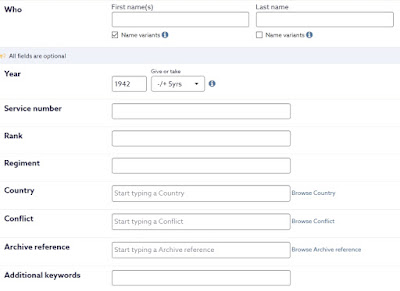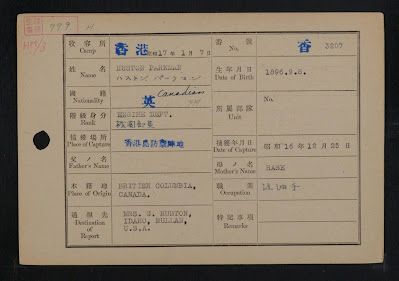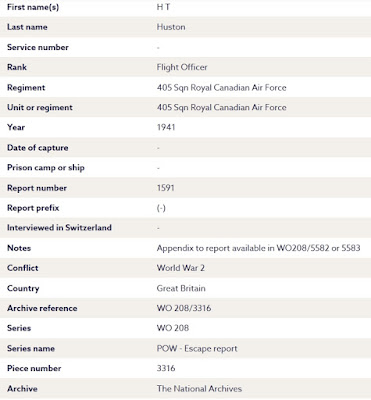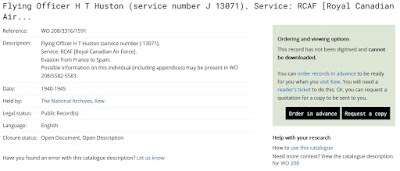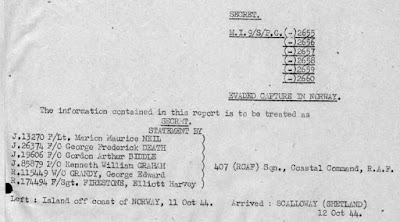In my post "My Top 10 Fee-Based Genealogy Sites" I limited myself to only 10 fee-based genealogy sites that I regularly depend upon in my research. However, in the case of the free genealogy sites, as I started making the list, it quickly got out of hand and I just couldn't keep the list at ten sites. So here is my top 10+ free genealogy sites that I regularly check.
Remember, these are my top free genealogy sites and I've selected them based on the names, places and time periods that I'm researching. I am positive I'm missed at least one of your favourite sites.
There is one site I didn't put on the list since its focus isn't on genealogy. That site is Google. Often when I get stuck looking for information I will use Google to explore what is out there. Often I come across those genealogy and family history gems buried on page two or three of the returned results.
1. FamilySearch
With your free account you have access to millions indexed abstracts and images along with their one world tree where anyone can contribute or correct information FamilySearch is a key tool in my genealogy toolbox. Yet there is a whole bunch of images not indexed and once you get comfortable with using their catalogue what is available to you is phenomenal. Although some of the image collections may not be viewable from home once their Family History Centers reopen many more digitized records will be accessible.
2. Library and Archives Canada
If you are researching your ancestors that at any time settled in Canada then Library and Archives Canada (LAC) is a site to visit. You may be disappointed that a vast majority of their collections are not digitized but I've found that the real value from LAC is from their various subject matter pages such as Census and the Military Heritage pages. Those pages help point you to where you can find the information, whether at LAC in Ottawa or on partner sites. Also, much like with FamilySearch, once you become familiar with using the catalogue search system so much more can be found.
3. Internet Archive
I make use of the Internet Archive to locate those out of copyright books that are often referred to as sources in family history compilations or in online databases. But that's not all that there is on the site. Maybe you are looking for the Canada Gazette for 1898-1899, you can find it here and can even download it in PDF or even EPUB format for reading on your computer later. You just don't know what is available unless you look for it. The other reason I use the Internet Archive is the Wayback Machine. This is an archive of over 477 billion (and growing) web pages on the Internet. A number of times when a web site has disappeared from the Internet I've been able to find an older copy in the Wayback Machine's archive.
4. Canadiana Héritage
First of all, this is not exactly your usual friendly genealogy web site. If you think of it as a collection of digitized microfilms that may or may not be name indexed or even fully catalogued then you will have set your expectations appropriately. Yet this has become an important site for my Canadian research. Many of the "C", "H", and "T" microfilms from Library and Archives Canada may be found here. In these often frustrating COVID-19 times where we can't get to an archive to review a microfilm, having any digitized microfilms can be wonderful. You will even find parish records from some churches in Nova Scotia, New Brunswick, Ontario, Quebec, and Manitoba.
5. Provincial Archives of New Brunswick
I wish all provinces were like New Brunswick when it comes to the free availability of indexed vital statistics records with images. It isn't just those birth, marriage, and death records that make the Provincial Archives of New Brunswick (PANB) site so invaluable in my research. You will find indexes to land petitions and grants, very early port returns from 1816-1838, marriage bonds between 1810-1932, Daniel F. Johnson's Newspaper Vital Statistics collection, and a lot of information contributed by Wallace Hale in the Fort Havoc pages concerning the Loyalists in New Brunswick. Those are just a few of the highlights on this site. If you have New Brunswick ancestors you really need to visit the PANB site.
6. BC Archives Genealogy Collection at the Royal BC Museum
It seems that in the various branches of my family tree sooner or later a group goes to British Columbia to live. Ancestry may have their British Columbia birth, marriage, or death indexed but the BC Archives Genealogy collection hosted by the Royal BC Museum has the births (1854-1903), marriages (1871-1944), deaths (1872-1999), colonial marriages (1859-1872) and baptisms (1836-1888) index is searchable with many of the records having images of the documents available for you to save to your computer.
7. WorldCat
WorldCat is one of those site that doesn't provide the records that we are so often looking for in our research. Instead it can help us find those sometimes hard to find books that have those transcriptions in libraries, archives, and museums. I remember one time looking for a book on the family of Simon Baxter and learned that the Canadian Museum of History had a copy in their reference library. I didn't even know that they had a reference library. A few days later I was able to review that book and learn more about that line on my family tree.
8. Commonwealth War Graves Commission
When researching one of those 1.7 million men and women of the Commonwealth forces who gave their lives in the First and Second World War then a visit to the Commonwealth War Graves Commission site is a requirement. There you will learn where the person is buried or memorialized, their service number (so important to later research), unit, and possibly other personal information. There may be additional documents such as what was to be recorded on the marker or panel.
9. Find A Grave
Find A Grave is one of those sites I either really love or hate depending on what I find and my mood. I love it when I comes across a memorial page that has the image of the marker that is readable or at least correctly transcribed. I hate it when there is no marker image but someone has created a memorial and they haven't stated where they got their facts. So I have learned to treat Find A Grave like a user contributed tree on Ancestry, don't trust but verity everything. That said, those memorials with images have helped me considerably in my own research. Even those without images have been handy as possible pointers to find the key records.
10. Public Libraries [Ottawa Public Library in my case]
Many of public libraries have genealogy databases available to anyone. These databases are often specific to the area and help point the way to find documents in the library. For example, if you have ancestors in the Belleville area of Ontario, Canada then checking out the Birth, Marriage and Death Indexes from the Belleville Intelligencer might be a really good idea. In these COVID-19 times many of the libraries, courtesy of Ancestry and ProQuest, have made available the library version of Ancestry to use from the safety and comfort of your home. Some libraries will even help you locate a copy of an obituary in the local newspaper as long as you provide the key details. As always, be polite when asking for help.
The next set didn't make my top 10 list of free resources but I couldn't leave them out. So here is the "+" list.
Nova Scotia Historical Vital Statistics
If you have
ancestors from Nova Scotia and you are trying to find their birth,
marriage, or death registration then you need to visit this site. It is
free to search and view the various registrations. However, unlike PANB
or the BC Archives Genealogy Collection, you need to pay to download the
registrations. So be prepared to create your own abstracts unless you
want to spend the money to have an electronic copy of the record.
Archives of Ontario
The Archives of Ontario don't have the birth, marriage, and death records on their site (go to FamilySearch or Ancestry instead) but where the Archives of Ontario shines for genealogists and family historians is in their research guides. Are you trying to find a divorce record in Ontario, then you need to read Research Guide 210. Looking for a birth registration and you don't know if has been released to the Archives of Ontario then Research Guides 202, 203, and 204 probably need to be read. Are you trying to figure out the districts and counties in Ontario over time? Then a visit to "A Guide to Boundaries, Names and Regional Governments" page is a good place to start. Did your immigrant ancestor come through the Toronto Emigrant Office between 1865 and 1883? Check out the Toronto Emigrant Office Assisted Immigration Registers.
WikiTree
I've been using and periodically contributing to WikiTree for about a year. This is a "one world" family tree much like what is found on FamilySearch. With a free account you can add people and update existing entries. What sets WikiTree apart from other trees is in their encouraging of making sure the information in a person's profile is sourced. This allows you to locate new sources of information in your own research.
IrishGenealogy.ie
The Irish Genealogy site should be one of your go to sites if you have ancestors that were in Ireland. They have the civil registrations for births (1864-1919), marriages (1845-1944), and deaths (1871-1969) in addition to church records of baptisms, marriages, and burials for a number of counties in Ireland.
The Ancestor Hunt
If you are looking for free archives of newspapers, yearbooks, or city directories for Canada and the United States then dropping my The Ancestor Hunt will make your search a lot easier.
The Ontario Name Index (TONI)
Courtesy of Ontario Ancestors (also known as Ontario Genealogical Society), TONI is one of those databases that can help you out in your Ontario research. As a name index it is important to realize that the database itself is just an index and will point you to where you can find the information. Most of the resources that TONI has indexed are documents held by the various branches but there are pointers to records from from other sites.
Bower-McBurney Genealogy
In addition to TONI, the Bower-McBurney Genealogy site has become an invaluable resource for my Ontario research. It isn't because I have any relatives related to that family but Wayne Bower has made available the images from the Wesleyan Methodist Baptismal Register and also the digitized microfilm index pages for the Ontario Birth Registers for 1914-1917.
Trove
Trove is just that, a treasure trove for those researching their relatives in Australia. There are digital copies of newspapers, government gazettes, maps, magazines, and newsletters. The newspapers and gazettes, especially the family notices in the various papers, are often where we as genealogy researchers head to first but don't forget to search the other collections for other nuggets.
Papers Past
Much like Trove for Australia, Papers Past is the source for New Zealand newspapers, magazines and journals, letters and diaries, and parliamentary papers. I don't have many distant relatives in New Zealand but for the branch that did settle there the newspapers have helped answer questions about their lives.
FreeBMD
FreeBMD is a searchable database of the birth, marriage, and death civil registration indexes for England and Wales. Even though fee-based sites may have this index, often from FreeBMD itself, this is the free version. Where I often find it of value is being able to see the original image of the index page and also to learn what places are within a registration district. Combined with the General Register Office (GRO) site for ordering the registrations I've been able to discover "missing" children that were born and died between census enumerations.
CanadaGenWeb's Cemetery Project
Much like Find A Grave, the CanadaGenWeb's Cemetery Project is a free and searchable listing of cemeteries. However, it is focused only on Canadian cemeteries. If I can't find the image of a marker that is in a Canadian cemetery in Find A Grave I always head to this site to see if a volunteer has photographed and placed the picture of the marker here.
JewishGen
One of my connected American branches has Jewish roots and the JewishGen site has been useful in providing clues about the family. The JewishGen Online Worldwide Burial Registry even has images of some of the markers along with providing location details about the cemetery.
National Library of Scotland
Along with ScotlandsPeople, the National Library of Scotland is one of those must use sites if you have Scottish ancestors. There are two items that I often use are the Maps and the Scottish Post Office Directories. However, there is much more to be found on this site.
There are many other free sites that I use in my research so this is really just my highlights list. I'm certain that I've not mentioned one of your favourite free genealogy sites. If so, leave a note in the comments since I'm always looking for new resources to help break down my various brick walls.


 As many of us know, researching those that served Canadian and survived the Second War can be a bit of a challenge since many of the records are still safeguarded by privacy rules. So it is always a good day when one stumbles upon another online collection to peruse during these strange times of COVID-19 restrictions.
As many of us know, researching those that served Canadian and survived the Second War can be a bit of a challenge since many of the records are still safeguarded by privacy rules. So it is always a good day when one stumbles upon another online collection to peruse during these strange times of COVID-19 restrictions.